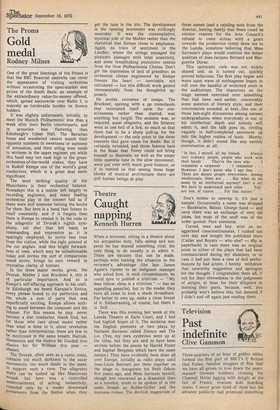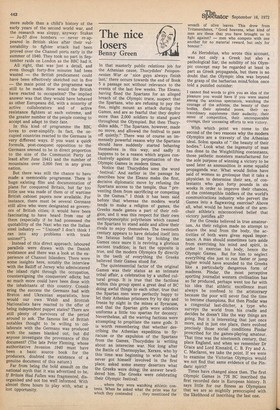Television
Past indefinite
Clive Gammon
Three-quarters of an hour of golden oldies formed the first part of BBC1's If Britain Had Fallen, familiar snippets of film that we have all grown to love down the years: massed German bombers crossing the Channel, Hitler jigging with delight at the fall of France, evacuee kids boarding trains. I never grow tired of them but the advance publicity had promised something
more subtle than a child's history of the early years of the second world war, and the research was sloppy, anyway: Stukas Ju-57 dive bombers — never re-ap peared in British skies after their vulnerability to fighter attack had been proved over the Channel ports early in the summer of 1940. They took no part in September raids on London as the BBC had it.
All right, that was just a detail, and even though forty-five minutes had been wasted — the British predicament could have been effectively sketched out in five — the main point of the programme was still to be made. How would the British have reacted to occupation? The implied answer was that they would have behaved as other Europeans did, with a minority of active collaborators and of active resistance fighters at each extreme, and the greater number of the people coming to accept and adapt to their fate.
In this kind of programme the BBC loves to over-simplify. In fact, the occupied countries reacted to the Germans in very different ways. If you want a quick formula, post-conquest opposition to the Germans seemed to be in direct proportion to the size of the Communist Party (at least after June 1941) and the number of mountains over 3,000 feet in any given nation.
But there was still the chance to have made a memorable programme. There is huge existing film and documentation of plans for conquered Britain, but far too little use was made of them or of wartime British cabinet papers now available. For instance, there must be several Germans still alive who were designated as governors of British cities; it would have been fascinating to have heard from one of them (especially if he had possessed the quotability of the Nazi who ran the Italian steel industry — "Unions? I don't think I ran into any problems with trade unions?").
Instead of this direct approach, laboured parallels were drawn with the Danish resistance and there was a look at the experience of Channel Islanders. There were some insights here, notably the interview with the Bailiff of Jersey who administered the island right through the occupation, countersigning the conquerors' edicts; but so much more could have been done with the inhabitants of this country. Considering the success the Germans had with Breton and Ukrainian separatists, how would our own Welsh and Scottish Nationalists have reacted to the offer of being independent puppet states? There are still plenty of survivors of the period around to ask. The famous list of British notables thought to be willing to collaborate with the Germans was produced with the names blanked out, but did anyone investigate the provenance of this document? (The late Peter Fleming, whose authoritative Invasion 1940 must have been a basic source book for the producers, doubted the existence of a genuine document of this nature.) Far from being the bold assault on the national myth that it was advertised to be, If Britain Had Fallen was fragmented, disorganised and not too well informed. With almost three hours to play with, what a lost opportunity.



































 Previous page
Previous page